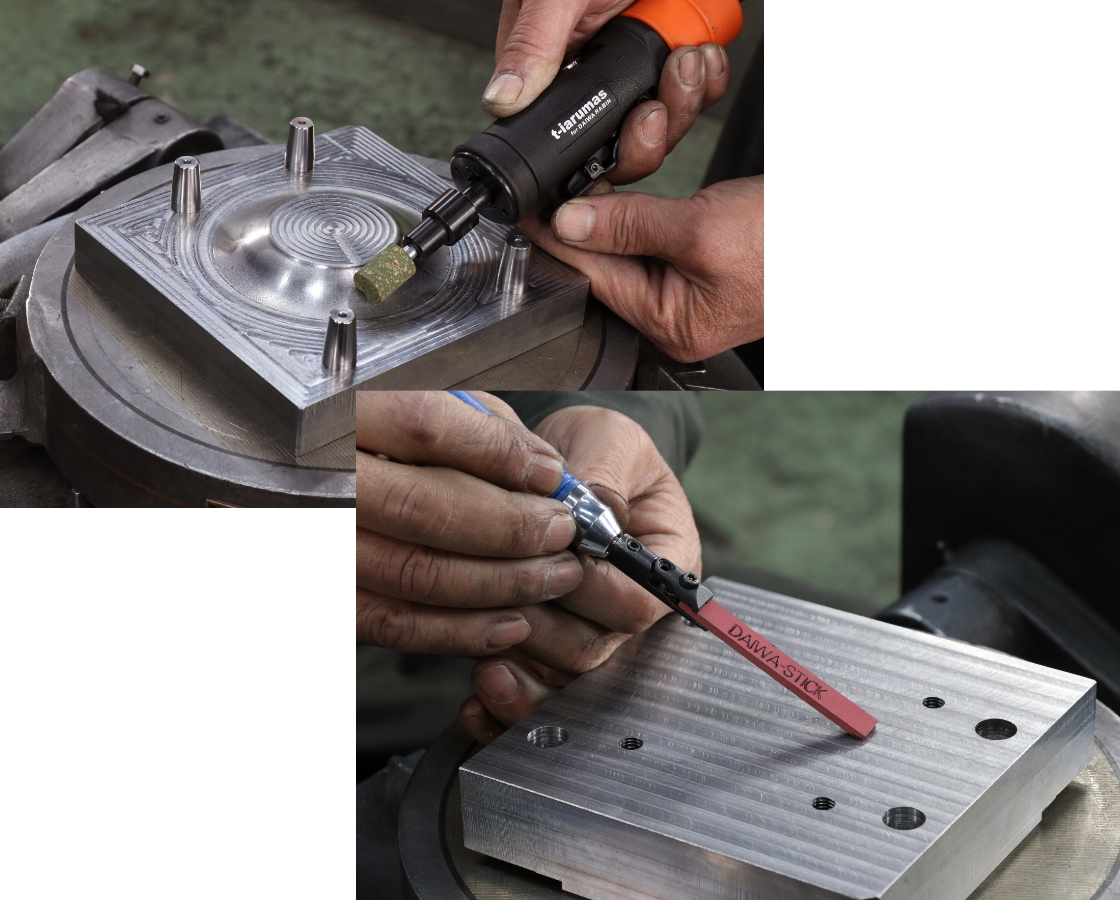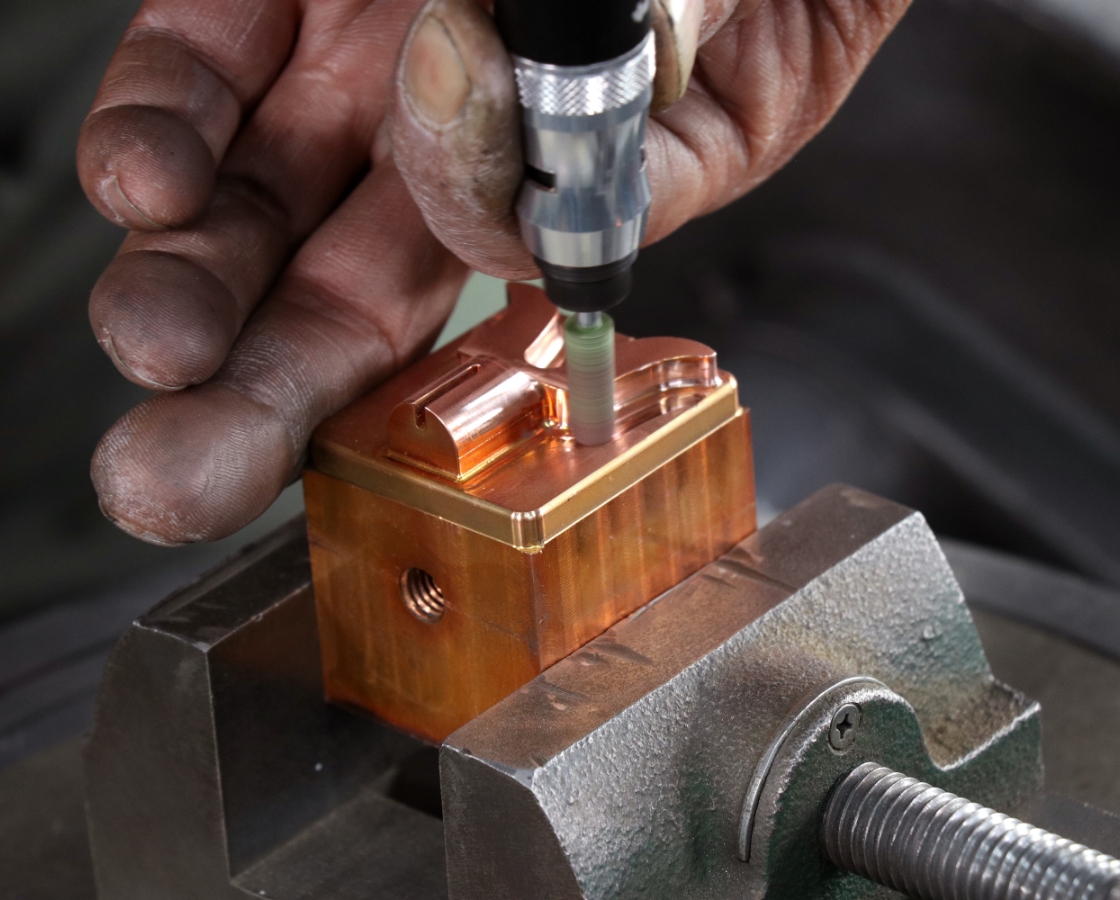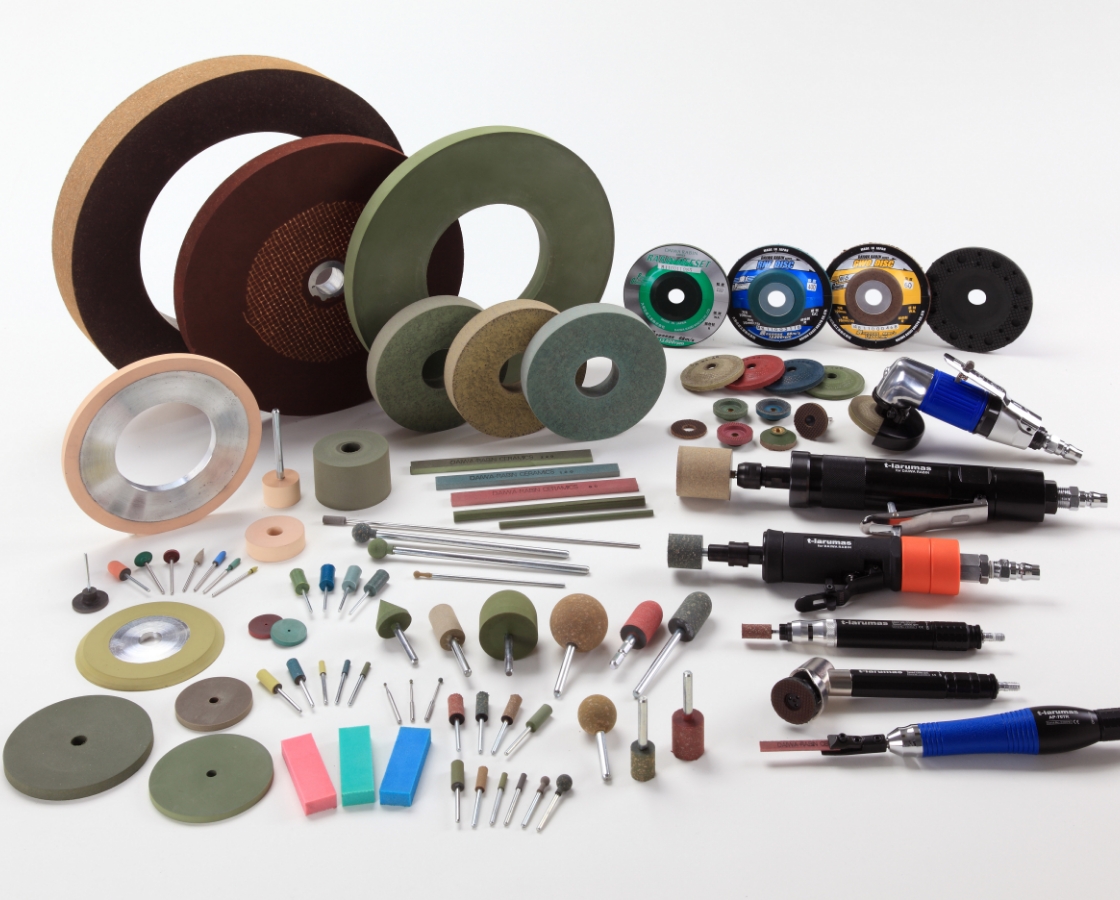- HOME
- Why Daiwa Rabin is chosen
Why Daiwa Rabin is chosen
-Excellent grinding power, Exquisite finishes
and Enhanced durability-
The Five Strengths of Daiwa Rabin
Rubber grinding stones utilize the elasticity of rubber, allowing them to deform to match the workpiece and perform polishing with minimal load
on the material.
Daiwa Rabin, with its proprietary technology, is characterized by its excellent grinding performance and can be widely applied to
grinding, polishing, deburring,and final finishing.
Another major strength of Daiwa Rabin is its proven reliability, demonstrated by long-standing use in demanding applications such as
turbine blades for aircraft engines, precision valves, turbochargers, and other components requiring the highest accuracy.
Strength 01
Applicable to a wide range of uses
Grinding and Polishing, United as One! Contributes to shorter processes and cost reduction without the need for multiple tools
Rubber grinding stones utilize the “rubber elasticity,” which deforms according to the load, making them less likely to cause deep scratches on the workpiece compared to hard grinding wheels or abrasive papers, while enabling uniform polishing.
A distinctive feature of Daiwa Rabin is the excellent grinding performance imparted to rubber grinding stones through its uniquely developed abrasive grains (CM type) and rubber design.
Traditionally, rubber grinding stones were associated only with “polishing,” but Daiwa Rabin has changed this perception, enabling processing from deburring to polishing.
By covering a wide range of processes—grinding, polishing, deburring, and final finishing—Daiwa Rabin improves manufacturing efficiency, contributing to shorter workflows, reduced working time, and lower overall costs.

Positioning of Daiwa Rabin

*Daiwa Rabin is mainly used for deburring (not suitable for sharp burrs) or from intermediate finishing onward.
It can be widely applied to shortening intermediate processes (before final finishing) as well as to final finishing.
Strength 02
Excellent workability
Enables stable operation by reducing the need for truing and adjustments
Rubber grinding stones that utilize rubber elasticity easily conform to curved surfaces, and compared to hard grinding wheels, they exhibit less bouncing and chattering, allowing for stable polishing operations.
Additionally, they are less prone to clogging on non-ferrous materials such as aluminum and brass, enabling continuous work without dressing. In deburring operations, secondary burrs are less likely to occur, improving the efficiency of deburring tasks.
When used according to the specified conditions, dedicated tools or fine adjustments for truing (shaping and balancing the grinding stone) and dressing are not required, allowing for efficient work without extra effort.

Strength 03
Friendly to both operators and the environment
Reduces dust and grinding fluids, contributing to improved working conditions
Rubber grinding stones can significantly reduce dust, helping to decrease waste and improve the working environment for operators.
Furthermore, because they do not require large amounts of grinding fluid, they serve as an effective measure to reduce environmental impact.
Compared to hard grinding wheels, they produce less bouncing and chattering, which also reduces the burden on operators.

Strength 04
Extensive lineup & custom development
Versatile!
Capable of handling a wide range of shapes and materials
At Daiwa Rabin, we develop and provide rubber grinding stones in a wide variety of shapes, sizes, and compositions, with more than 18,000 items in our lineup. From this extensive selection, you can choose the most suitable product for your application and work.
In addition, applicable materials range widely, including mold materials, rubber, resins, plastics, soft metals, aluminum, difficult-to-machine materials such as SUS, high-hardness brittle materials, and various coatings.
If existing products cannot meet your requirements, we can develop custom-made items according to your specifications. Our development speed and responsiveness allow us to meet diverse customer needs.

Strength 05
Exploring new possibilities for rubber grinding stones
Continuously creating new technologies that meet the needs of the times through outstanding development capabilities
At Daiwa Rabin, we actively engage in developing innovative products that expand the potential of rubber grinding stones. Unique products that cannot be achieved with other abrasives include the “Diamond Rabin,” a diamond tool with unprecedented performance achieved through an optimal combination of rubber properties and diamond abrasive grains, and the “G-Lap Rabin,” which incorporates cerium oxide into rubber to enable glass mirror polishing using a fixed-grain method.
We have also accumulated expertise to support automation in recent manufacturing processes. As specialists in rubber grinding stones, we can propose the most suitable products according to our customers’ specific applications.

